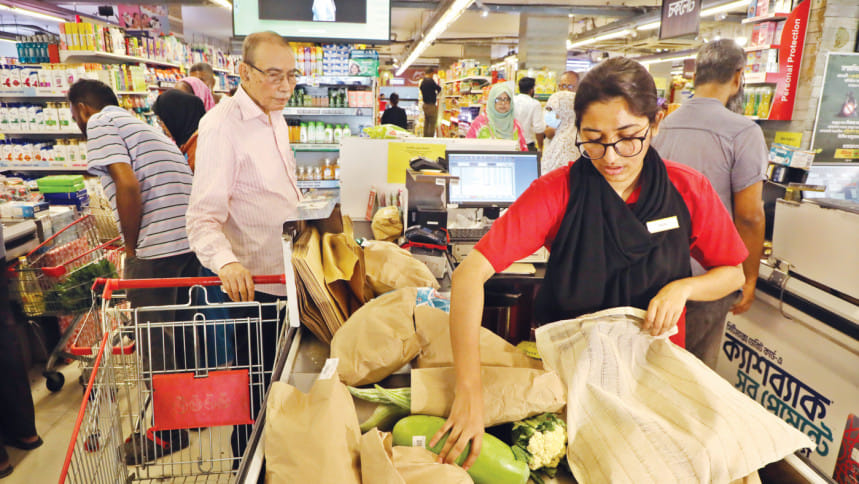Ban on polythene bags a boon for eco-friendly sack makers

Until early September this year, Mahfuza Begum's Surzu Handicrafts was making eco-friendly, lightweight and reusable net shopping bags out of jute and cotton for a handful of buyers.
And it was not on a regular basis, for putting in the effort required the placement of orders from buyers first.
Since the middle of last month, her small production unit with 10 machines has been busy making the bags thanks to the interim government's decision to ban the use of polythene and polypropylene shopping bags across all superstores.
The ban came into effect from October 1.
Since then, Surzu Handicrafts has supplied more than 20,000 shopping bags to supermarkets. At present, Begum has orders from supermarket chains to supply another 32,000 bags.
"Biodegradable bags were neglected and their use was limited and deemed as fancy. Now, we see a huge demand," she said.
Prior to the ban, Surzu Handicrafts used to make roughly 1,000 bags a month. "We could run two-three machines daily at that time," she said.
She said increased demand for the eco-friendly bags has created employment opportunities for many. "I have engaged 15 women to make the bags in their homes," said Begum.
Tahmidul Islam, owner of Baeki Centre, which also makes eco-friendly bags, said they used to make promotional items before the government asked supermarkets to use biodegradable bags.
Since the ban came into effect, Baeki has supplied more than 30,000 bags to superstores, he said.
LACK OF SUPPLY OF FABRIC
Both Begum and Islam said although they were seeing very high demand from supermarkets, they were unable to meet it because of an alleged shortage of fabric used to make the bags.
Besides, prices of jute and cotton fabrics have shot up suddenly, they said.
"There is huge demand but the problem is a lack of availability of the fabric," said Islam.
He said prior to the ban, one yard of fabric cost Tk 32 but now the price has risen to Tk 38 to Tk 40.
"This has increased our production cost," he said.
Another challenge was that most supermarkets want to delay making payments as much as possible, he said.
"We have to buy fabrics with cash payments but most superstores do not want to pay us instantly," said Islam.
"This has led to us having a lack of working capital. If we got payments every week, we would have been able to pay our fabric makers and keep production uninterrupted," he said.
Begum said the raw materials required for manufacturing the bags have become scarce.
Businesses said most of the jute goods makers were focused on making fabrics suitable for the export market and were unprepared to meet the sudden spike in demand for fabrics used for low-cost shopping bags.
"We have had to start hurriedly so that we can supply the superstores," said Begum.
Sabbir H Nasir, managing director of Shwapno, the largest retail chain, said the ban had posed implementation challenges.
"We need one lakh shopping bags for our stores daily. We get around 1,000 to 2,000 bags…So, there is a huge demand and supply gap," he said.
Nasir said they were offering shopping bags for anywhere between Tk 6 and Tk 20 so as to refrain from putting too much pressure on customers.
"We have to use two paper bags for fish and meat. This is costly for us. But we have to do this as wax laminated paper bags are unavailable in Bangladesh," he said.
"What is needed is to ensure the production of wax laminated paper bags and increase the supply of jute bags," he added.
"Raising awareness among customers is necessary as not all customers are taking the move positively. We are encouraging them to reuse the bags," said Nasir.
"Once our ancestors used to go shop with bags. We need to start a campaign to adopt old habits," he said.
Nasir said amid the shortage of bags, they were requesting customers to bring their own bags.
He said the government could have encouraged a gradual shift toward the eco-friendly bags.
Murtoza Zaman, chief executive of Unimart, said they were providing customers reusable jute and cloth bags by sourcing them from various places but they were not getting adequate supplies.
Moreover, prices could not be brought down, with the minimum price for each bag hovering at Tk 29, he said.
"If the government can ensure raw materials for bag makers, it would be a great help for them," he said.
Md Rashedul Karim Munna, president of the Bangladesh Jute Diversified Products Manufacturers and Exporters Association, said there was a lot of interest on jute-based shopping bags.
"But the industry had no preparation to make fabrics for low-cost bags. Separate materials will be needed to make such bags. Entrepreneurs will have to invest separately," he said.
"So, they need assurance from the government that they will enforce the rule on the mandatory use of eco-friendly shopping bags," he said.
He said the government should issue a gazette that the ban will remain in force for at least three years.
"This will create a big domestic market for jute and a lot of jobs," he said.
Munna, also managing director of a diversified jute goods-making firm Creation Private Ltd, said the government should also consider lifting VAT on the sales of supermarkets to incentivise both superstores operators and customers to use eco-friendly bags.

 For all latest news, follow The Daily Star's Google News channel.
For all latest news, follow The Daily Star's Google News channel. 



Comments